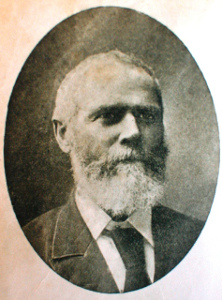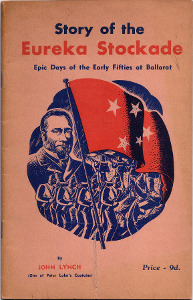
Lynch was born at Ennis, County Clare, Ireland, on 25 December 1828. He came to Australia in 1852 as part of the 1850s gold rush, arrived at Bendigo in March 1853, and was present at the time of the “Red Ribbon” movement for miners’ rights.
From Bendigo, Lynch moved on to Ballarat, where trouble erupted over the draconian behaviour of the police towards the gold miners.
John became one of Peter Lalor’s captains in the Eureka Rebellion, and was reported to have been in charge of the pikemen. After the battle at Eureka, he was arrested and jailed for a week, following which he appeared in court to face charges; however, in the absence of any relevant witnesses against him, he was discharged.

After Ballarat, he moved on to the goldfields at Smythe’s Creek (later known as Smythesdale), where he built a home. He gained work in the area as a surveyor for the Victorian government. Lynch married Scottish-born Isabella MacGregor in Ballarat in 1857, and together they had fourteen children, seven of whom tragically died from diphtheria within a few days of each other.
Lynch was an accomplished mathematician, classical scholar, and poetry aficionado, particularly known for his recitations of the verses of the Scottish poet Robert Burns. He became a pillar of the community, being a founder of the Ballarat School of Mines, a local councilor for Smythesdale, and the first chairman of the Municipality of Browns and Scarsdale. He worked as a mining surveyor for almost fifty years.
Following a few years of poor health, John Lynch died on 21 March 1906, in Smythesdale, Victoria.
John Lynch had a famous son, Arthur Alfred Lynch (1861-1934), who went to Europe and became a journalist, poet, and politician (representing Irish interests). He entered the Boer War, although he joined the Boers, rather than fighting for the British, and was appointed as a colonel in charge of a force of foreign volunteers (many of whom were Irish). During the war he was elected, in his absence, as the Irish Nationalist member for Galway, and he later brazenly travelled to England to take up his seat in parliament. He landed in England in June 1902 and was immediately arrested and charged with treason, despite his protestations of being Australian, and sentenced to death. Luckily for him, a large-scale campaign resulted in the sentence being commuted to life imprisonment; he was released a year later, and subsequently received a pardon. Arthur Lynch went on to become the elected member of parliament for West Clare in 1909.
Works by John Lynch:
The Story of the Eureka Stockade [1947?]
Originally published as a monthly series of six articles in The Austral Light (October 1893 to March 1894), this was later published as a booklet (circa 1947).
Articles about John Lynch:
[Mr. John Lynch] [22 March 1906]
The Age, 22 March 1906.
Eureka veteran dead: Father of “Colonel” Lynch [22 March 1906]
The Argus, 22 March 1906.
A Eureka hero: Death of Mr. John Lynch [31 March 1906]
The Freeman’s Journal, 31 March 1906.
References:
“Ballaarat”, The Sydney Morning Herald (Sydney, NSW), 18 December 1854, page 3
“Municipality of Browns and Scarsdale: Annual election notice” (advertisment), The Star (Ballarat, Vic.), 18 July 1863 , page 3
“Ballarat pioneers: Two old residents dead”, The Advertiser (Adelaide, SA), 22 March 1906, page 4
“About people”, The Age (Melbourne, Vic.), 22 March 1906, page 5
“Eureka veteran dead”, The Argus (Melbourne, Vic.), 22 March 1906, page 5
“A Eureka hero”, The Freeman’s Journal (Sydney, NSW), 31 March 1906, page 19
Jennifer Lorch, “Carboni, Raffaello (1817–1875)”, Australian Dictionary of Biography, National Centre of Biography, Australian National University (accessed 26 August 2013)
John Lynch, The Story of the Eureka Stockade, Melbourne: Australian Catholic Truth Society, [1947?], pages 27-33 (chapter 5)
Geoffrey Serle, “Lynch, Arthur Alfred (1861–1934)”, Australian Dictionary of Biography, National Centre of Biography, Australian National University (accessed 26 August 2013)
Leave a Reply